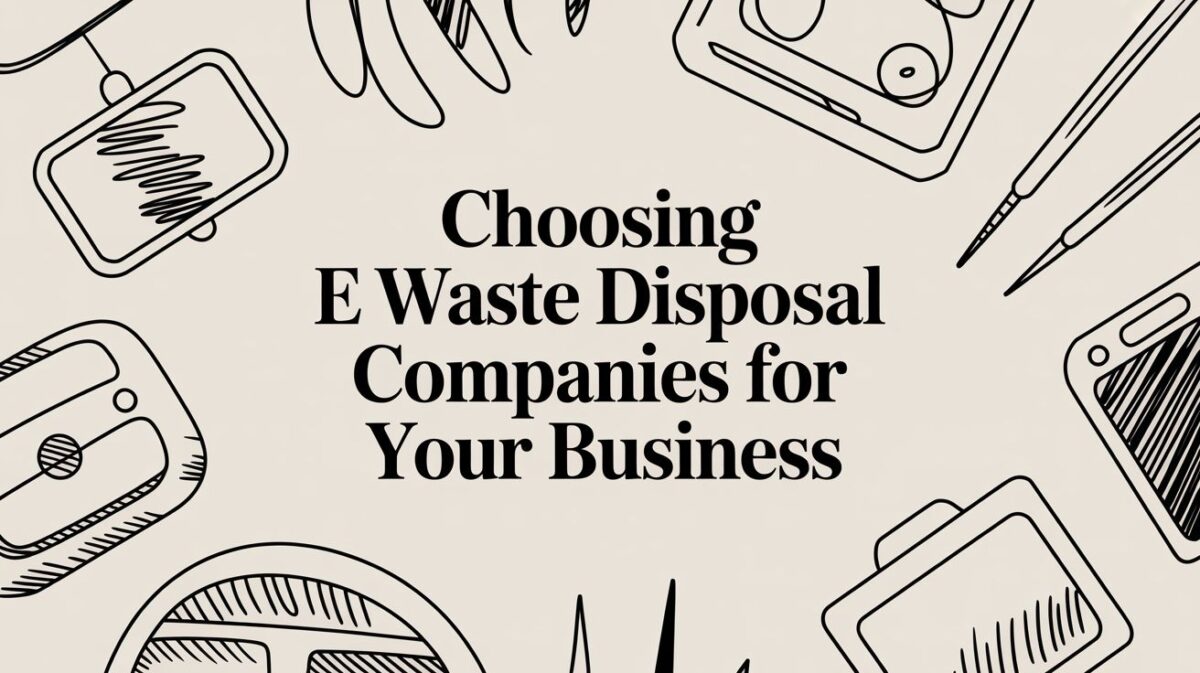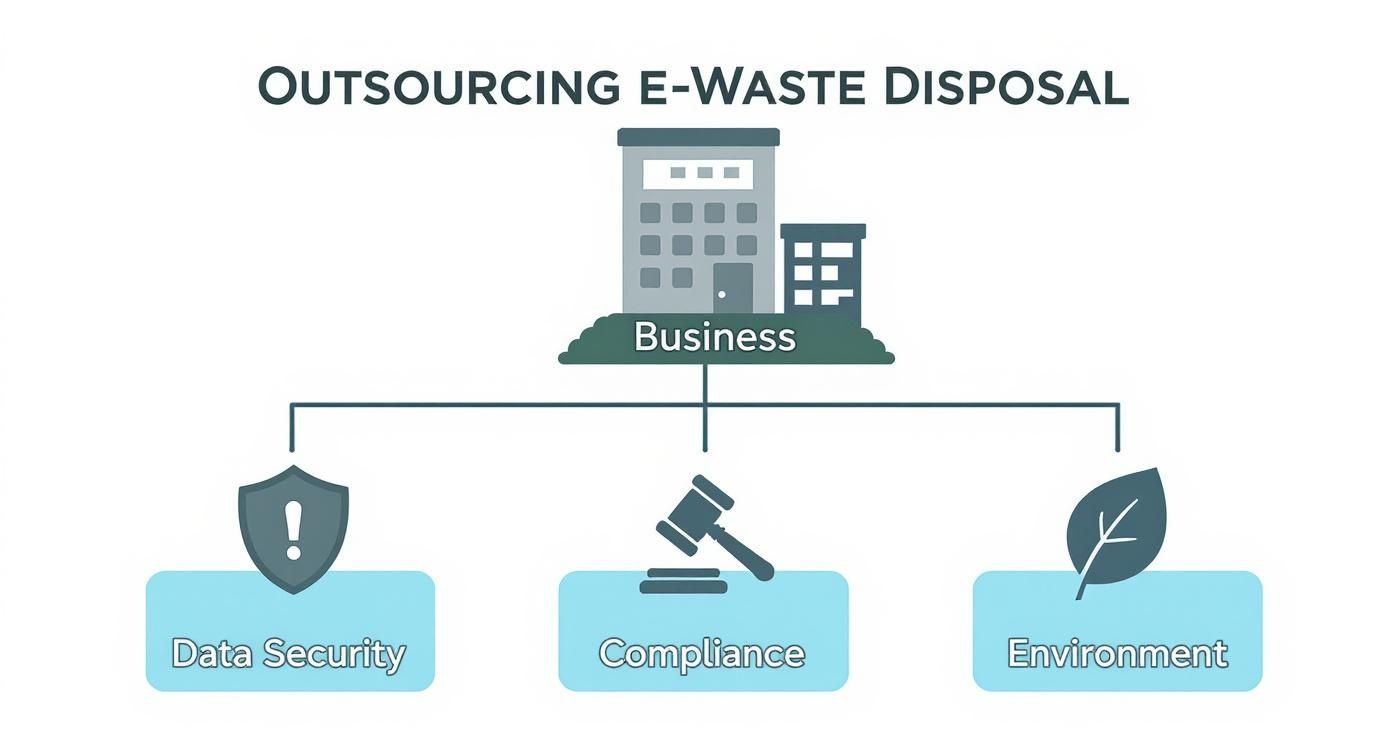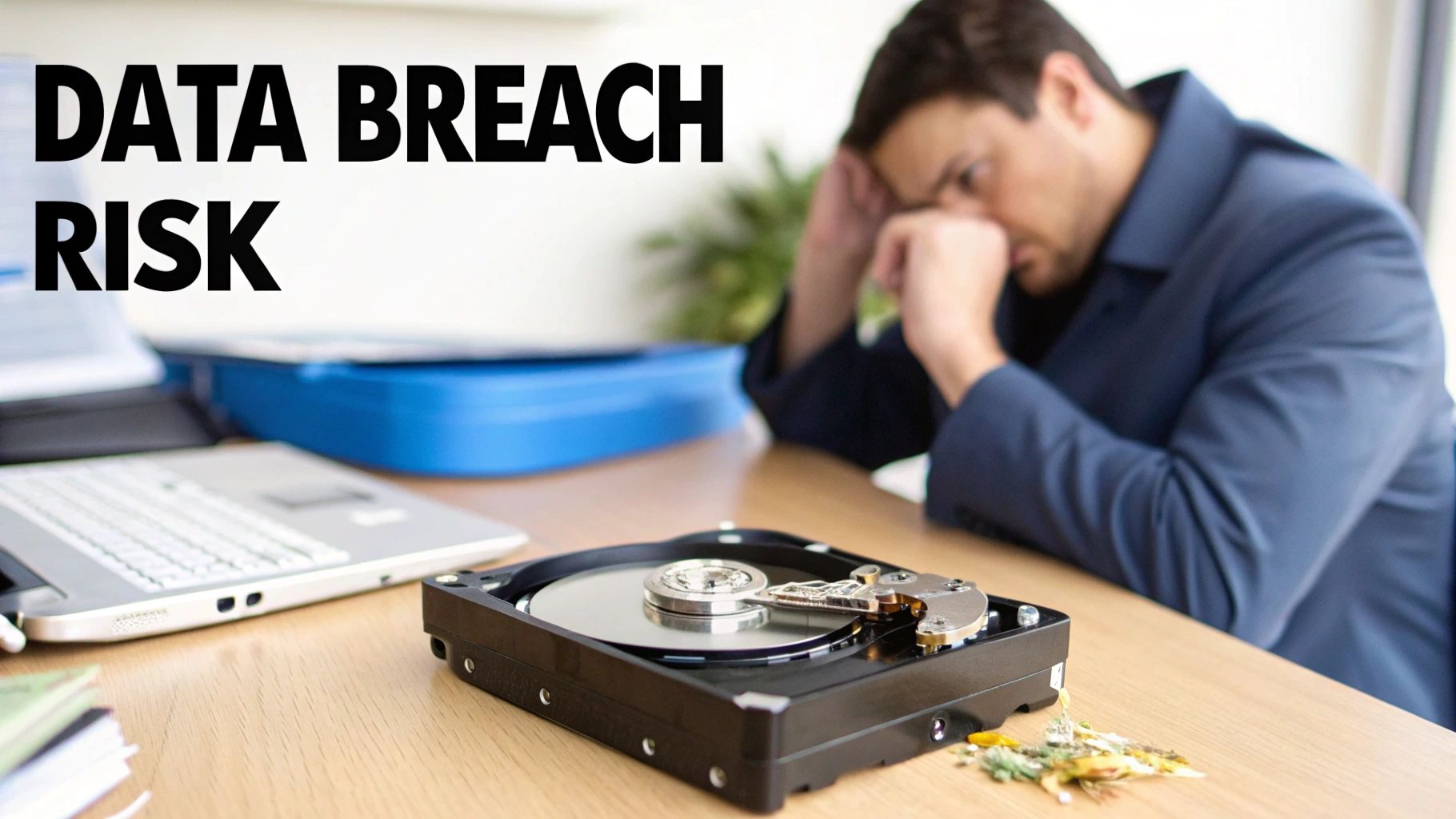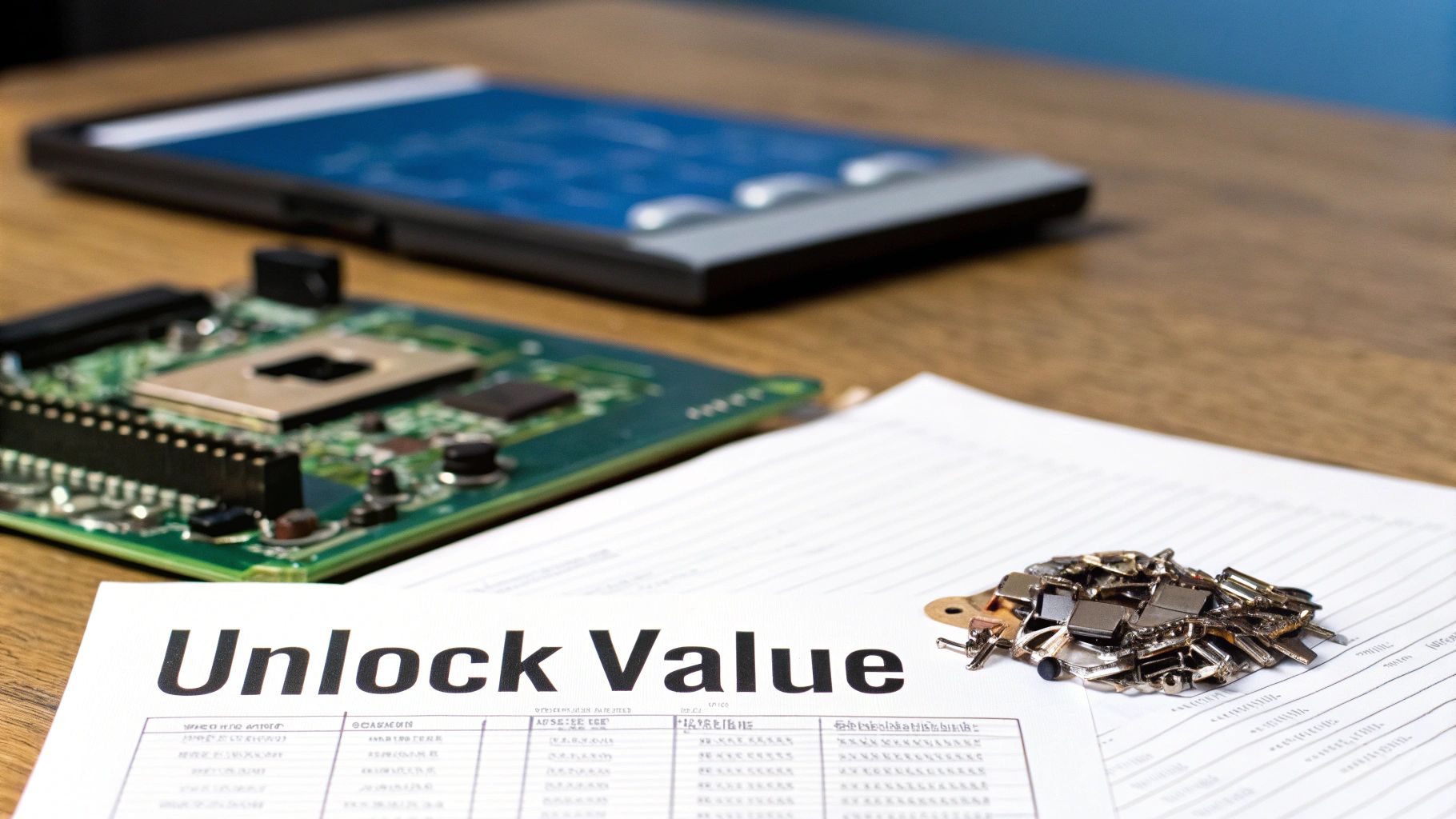Choosing E Waste Disposal Companies for Your Business

That stack of old laptops and servers in your storage closet isn't just taking up space—it’s a ticking time bomb of data liabilities and compliance risks. Specialized e waste disposal companies are more than just a pickup service; they’re a critical shield for your business, handling everything from ironclad data destruction to environmental compliance and asset recovery.
Ultimately, they protect your company’s reputation and your bottom line.
Why Smart Businesses Outsource E Waste Disposal
Think of a professional e-waste partner not as a trash service, but as a specialized extension of your risk management and IT teams. Every outdated desktop, server, or company phone holds a treasure trove of sensitive information—client lists, financial records, employee data, and intellectual property. Letting these devices pile up or disposing of them improperly creates a massive vulnerability.
Partnering with certified experts lifts this entire burden off your shoulders. They manage the complete end-of-life process for your IT assets, making sure every step is secure, compliant, and fully documented. This simple shift turns a nagging internal headache into a managed service, freeing up your IT team to focus on strategic initiatives instead of dealing with logistical nightmares.
The Hidden Liabilities in Old Electronics
It’s easy to underestimate the risks locked inside your retired technology. The potential for a data breach from a single improperly wiped hard drive is enormous, and the consequences go far beyond just financial penalties. A damaged brand reputation can take years to rebuild, if ever.
On top of that, environmental regulations are only getting stricter. A mistake in disposal can lead to steep fines and legal headaches. This is where professional e-waste disposal companies prove their real value. They’re your safeguard against:
- Catastrophic Data Breaches: Ensuring every last bit of sensitive corporate and customer data is permanently and verifiably destroyed.
- Compliance Violations: Keeping your operations in line with all local, state, and federal disposal regulations like HIPAA, GLBA, or PCI DSS.
- Negative Brand Perception: Demonstrating your commitment to corporate social responsibility to clients, investors, and the community.
Outsourcing isn't just about convenience; it's a strategic decision to transfer immense risk. By handing over your obsolete assets, you are effectively offloading the legal, financial, and reputational liabilities tied to data security and environmental stewardship.
This process is about so much more than just recycling. It's about establishing a secure chain of custody that starts the moment that equipment leaves your facility. You can learn more about the critical role of secure data removal by exploring professional hard drive destruction services and how they protect your organization. This proactive approach turns a potential liability into a well-managed, buttoned-up business process.
Decoding E Waste Disposal Services
When you engage a professional e waste disposal company, you’re doing a lot more than just hiring someone to haul away old gear. You're investing in a complete set of safeguards built to protect your business from every angle. These aren’t just simple haulers; their services are the three critical pillars that support your organization's security, compliance, and financial well-being.
Understanding what they really offer clarifies the true value a certified partner brings to your operations. At their core, these commercial services are all about managing risk, ensuring compliance, and maximizing asset value. A quality provider builds its entire reputation on getting these things right, every single time.
The infographic below breaks down how handing off your e-waste to a specialist tackles the big worries for any business: data security, compliance, and environmental responsibility.
As you can see, a strategic partnership is really about transferring these complex, high-stakes responsibilities to an expert who handles them for a living, securing your operations in the process.
Secure Data Destruction Is Non-Negotiable
Let's be clear: the single most critical service you're paying for is secure data destruction. A forgotten hard drive in a landfill or on the secondary market is a data breach just waiting to happen. Reputable providers offer several methods to ensure your sensitive information is gone for good, and they can tailor the approach to your security requirements.
- Data Wiping: A software-based approach using NIST 800-88 standards to overwrite data, making original files irrecoverable. It’s ideal for devices slated for remarketing or redeployment.
- Degaussing: This method uses a powerful magnetic field to instantly scramble the magnetic data on storage media like hard drives and tapes, rendering them completely blank.
- Physical Shredding: For hardware that's at the absolute end of its life, physical destruction is the final answer. Industrial-grade shredders tear hard drives into tiny, mangled pieces of metal, making data recovery absolutely impossible.
This multi-layered defense ensures that no matter the final disposition of the device—whether it's resold or recycled—your confidential business data remains protected.
Core Services from E Waste Disposal Companies
| Service | What It Achieves | Business Risk Mitigated |
|---|---|---|
| Secure Data Destruction | Permanently erases all sensitive information from storage devices. | Data breaches, intellectual property theft, and reputational damage. |
| Certified Recycling | Ensures all electronic components are processed in an environmentally safe and legally compliant manner. | Fines for improper disposal and negative environmental impact. |
| IT Asset Disposition (ITAD) | Provides a transparent, auditable trail for every retired asset, from pickup to final disposal. | Compliance violations, lost assets, and audit failures. |
These core functions are the foundation of any reliable e-waste management program, turning a potential liability into a securely managed process.
Certified Recycling and Compliance
Beyond wiping data, your business is accountable for the physical fate of your old electronics. Improper disposal can lead to hefty fines and serious environmental harm. This is where industry certifications become your proof of due diligence.
Certifications like R2v3 (Responsible Recycling) and e-Stewards are the gold standard in this industry. They aren’t just fancy logos; they’re a guarantee that a company meets the toughest environmental, health, and safety standards, including a zero-landfill policy and a ban on exporting hazardous e-waste.
These certifications provide peace of mind, confirming your partner follows ethical and legally sound recycling processes. To get a better handle on the bigger picture, this essential guide to e-waste recycling is a great resource that covers its environmental and economic impacts.
Transparent IT Asset Disposition (ITAD)
Finally, a top-tier provider offers a complete IT Asset Disposition (ITAD) program. This isn’t just disposal; it’s the strategic management of your retired IT equipment, designed to maximize value recovery while eliminating all risks. A solid ITAD process creates a clear, documented chain of custody for every single asset from the moment it leaves your facility.
This includes detailed inventory lists, secure logistics, and meticulous reporting, including official Certificates of Destruction. It’s the full suite of documentation you need to prove compliance during an internal or external audit. You can get a deeper dive into the process by exploring this overview of what IT asset disposition is and how it helps modern businesses stay protected.
The Real Costs of Ignoring Your E-Waste Problem
Thinking of professional e-waste disposal as just another operational expense is a critical mistake. The real cost isn’t the service fee—it's the avalanche of consequences that comes from cutting corners. When you let outdated electronics pile up, you're exposing your business to a trio of high-stakes risks that can drain your finances, tarnish your reputation, and land you in hot water with regulators.
Hiring e-waste disposal companies isn’t just about cleaning out a storage room. It’s a direct investment in your company’s security, legal standing, and public image. Failing to make that investment leaves your organization vulnerable to problems that are often impossible to undo.
The Data Breach Catastrophe
Every single discarded hard drive, server, or company phone is a data breach waiting to happen. A simple factory reset is not enough. With the right tools, bad actors can easily recover sensitive information from improperly wiped devices—think customer databases, financial reports, and your most valuable intellectual property.
A single breach can be devastating, costing millions in regulatory fines, recovery efforts, and lost business. The hit to your reputation alone can destroy the customer trust you spent years building.
Steep Penalties for Non-Compliance
Regulators are no longer looking the other way when it comes to data and environmental compliance. A complex web of laws dictates exactly how businesses must handle their electronic assets at the end of their life. Mismanagement can lead to staggering financial penalties.
These aren't just minor infractions. The regulations include:
- Data Privacy Laws: Regulations like GDPR and various state-level privacy acts come with massive fines for exposing personal data.
- Industry-Specific Rules: If you're in healthcare, you've got HIPAA to worry about. Financial institutions have strict mandates like GLBA to follow.
- Environmental Statutes: Both federal and state laws prohibit dumping electronics, which are often classified as hazardous waste, in landfills.
Partnering with a certified e-waste disposal company is your best defense. Their documented, compliant processes provide an auditable trail, proving you took every necessary step to protect data and the environment, effectively shielding you from these legal and financial threats.
Damage to Your Brand and Reputation
In today’s market, customers and partners want to work with companies that take their ethical and environmental responsibilities seriously. How you handle your e-waste is a direct reflection of your commitment to Corporate Social Responsibility (CSR). A news story about your company's old computers being found in a landfill can cause immediate and lasting harm to your brand.
On the flip side, a documented, responsible recycling program becomes a positive talking point. It proves to everyone—customers, investors, and employees—that you're a forward-thinking organization committed to sustainability and data security. This proactive approach doesn't just manage risk; it actively strengthens your brand and builds loyalty.
How to Choose the Right Disposal Partner
Picking the right partner from a sea of e waste disposal companies is one of the most important decisions your business will make for managing its IT lifecycle. This isn't just about finding the cheapest pickup service; it’s about trusting a vendor with your company’s sensitive data, its legal compliance, and its reputation.
Getting this right requires more than a quick glance at a website. Think of it like hiring a critical new vendor for your risk management team. You’d never bring someone on board without checking their credentials and references, and you should apply that same level of scrutiny here. A thorough vetting process protects your business and ensures your partner is a true asset, not a hidden liability.
Start with Certifications and Standards
Your first filter should always be industry certifications. These are your proof that a company operates at the highest level of environmental, security, and operational standards. Without them, you have no real guarantee of where your equipment, or your data, will actually end up.
Keep an eye out for these two key certifications above all others:
- R2v3 (Responsible Recycling): This is the leading global standard for electronics recycling. It confirms that a partner follows strict best practices for environmental safety, worker health, and data security.
- e-Stewards: Known for its incredibly tough standards, an e-Stewards certification guarantees that absolutely nothing ends up in a landfill and prohibits the export of hazardous e-waste to developing countries.
On top of that, any top-tier partner must confirm their data destruction methods are aligned with NIST 800-88 standards. This is the government’s official guideline for media sanitization, providing a clear framework for wiping, degaussing, or physically shredding any data-bearing device.
Assess Their Logistical and Security Capabilities
Once you’ve confirmed their credentials, dig into their real-world capabilities. A certified company still needs the operational muscle to handle your specific project securely and efficiently. Can they manage the scale of your IT asset refresh? Do they have robust security protocols in place from the moment your assets leave your facility?
A vendor’s logistics process is a direct reflection of their security posture. A secure chain of custody isn't just a buzzword; it's a documented, unbroken line of accountability that tracks your assets from your door to their final disposition.
You need to ask potential e waste disposal companies some direct questions about how they operate:
- Do they use their own vetted employees and GPS-tracked trucks for transport?
- Are their facilities secure, with controlled access and 24/7 surveillance?
- Can they bring services like hard drive shredding on-site to your location for maximum security?
Demand Auditable Documentation
At the end of the day, the ultimate proof of a job done right is the paperwork. Any reputable provider must give you comprehensive, auditable documentation that closes the loop on every single asset. This isn’t optional—it’s your legal defense if an auditor or regulator comes knocking.
Your partner must provide a detailed Certificate of Destruction. This is a legally binding document that acts as your official record of compliant disposal and data sanitization, and it should list every single serialized asset to confirm your data is gone for good. To get a better handle on this critical document, you can learn more about what a Certificate of Destruction entails and why it’s so important for your business. This documentation is the final, crucial piece of evidence that proves you’ve met your due diligence obligations.
The Growing Global E-Waste Challenge for Businesses
To fully grasp why partnering with e-waste disposal companies is so critical, it's important to understand the bigger picture. The volume of discarded electronics isn't just growing—it's exploding, turning what was once a manageable problem into a full-blown global crisis for businesses. This isn't just about a few old office computers anymore. It’s a constant, relentless wave of servers, smartphones, and networking gear being decommissioned every single day.
This surge is fueled by two powerful forces. First, technology refresh cycles are accelerating as businesses race to maintain a competitive edge. Second, the sheer number of connected devices—from IoT sensors in a warehouse to smart equipment in the office—has skyrocketed. It's a perfect storm, and it's rapidly increasing the volume of e-waste that companies are responsible for managing.
The Numbers Behind the Crisis Are Escalating
The scale of this challenge is staggering. The global e-waste management industry is scrambling to keep up. In 2024, the world generated an estimated 69.1 million metric tons of e-waste. That number is projected to jump to 73.1 million metric tons in 2025.
By 2030, analysts predict we'll hit a mind-boggling 101.3 million metric tons. That's a compound annual growth rate of 6.7% between 2025 and 2030.
This massive increase lands squarely on the shoulders of businesses. More devices mean more corporate responsibility and liability. Every piece of retired equipment holds a cocktail of hazardous materials and sensitive data, making proper disposal a complex legal and environmental tightrope walk.
This isn't just an environmental talking point; it's a fundamental business reality. The escalating e-waste stream means companies are now key players in a global effort to manage a finite and challenging resource, whether they are prepared for that role or not.
Understanding the broader context here is critical. Getting a handle on the environmental impact of electronic waste clarifies just how high the stakes are for your business and the planet. At the same time, exploring broader strategies to reduce electronic waste shows that this isn't just a problem—it's an opportunity for businesses to lead the way with responsible partnerships.
Finding Hidden Value in Your Old Technology
What if that closet full of obsolete electronics wasn't just a storage problem? Shifting your perspective can turn old IT equipment from a liability into a genuine asset. Inside those forgotten servers, laptops, and networking gear lies a surprising amount of recoverable value waiting to be unlocked.
Many businesses don't realize their e-waste is packed with valuable raw materials like gold, silver, copper, and palladium. Globally, the missed opportunity is enormous. In 2022 alone, the world generated 62 million metric tons of e-waste, but a staggering 78% of it was never properly collected or recycled. This means an estimated $62 billion in recoverable natural resources was simply lost—often buried in landfills. You can explore the full e-waste report findings to see the scale of the problem.
Unlocking Value Through ITAD Services
This is where specialized e waste disposal companies and their IT Asset Disposition (ITAD) services make all the difference. They have the expertise to audit your retired assets, assess their condition, and determine the best strategy to maximize the financial return for your business.
A top-tier partner can quickly identify equipment that still has market value. Through secure refurbishment and data sanitization, they can prepare these devices for the secondary market, generating a direct financial return that can significantly offset—or even exceed—your disposal costs.
A strategic ITAD program transforms a cost center into a potential revenue stream. It’s a powerful demonstration that responsible environmental stewardship and smart financial management can, and should, go hand in hand.
From Resale to Resource Reclamation
But what about the gear that’s too old or damaged for resale? The value recovery process doesn't stop there.
Your disposal partner will responsibly dismantle this equipment to reclaim the precious raw materials locked inside. This process feeds directly into a circular economy, reducing the need for new mining operations and conserving finite resources.
By partnering with experts in IT equipment recycling, you ensure that every single component is handled responsibly. It’s an approach that's not just good for the environment but also makes solid financial sense, proving that a smart disposal strategy can add real, tangible value back to your bottom line.
Got Questions? We've Got Answers
When it comes to managing retired IT assets, a few questions always come up. Here are straightforward answers to what business leaders and IT managers are asking, so you can make an informed decision.
What Kinds of Businesses Need This Service?
Any business that uses electronics—from laptops and servers to specialized industrial or medical equipment—needs a formal IT asset disposition plan.
If your company handles any kind of sensitive information—customer data, patient records, financial statements, intellectual property—or is subject to environmental regulations, then working with a certified e-waste partner is not just a good idea, it's essential for compliance and risk management. It doesn't matter if you're in finance, healthcare, manufacturing, or retail; data security and compliance are universal obligations.
How Much Does Professional E-Waste Disposal Cost?
The cost typically depends on the volume and type of equipment, the level of data destruction required, and logistical factors like pickup and transportation. However, it's more accurate to view this as an investment in risk mitigation rather than a simple expense.
A single data breach or a compliance fine for improper disposal can cost your business far more than a secure, professional service ever will. Furthermore, reputable ITAD partners offer value recovery programs where they can remarket your viable assets, which can offset—or even cover—the entire cost of the service.
What's a Certificate of Destruction and Why Is It So Important?
Think of a Certificate of Destruction as your official, legally-binding proof of due diligence. It's a document that certifies your electronic media and the sensitive data on them were destroyed according to strict industry standards, such as NIST 800-88.
This certificate is your essential documentation for audits. It proves you fulfilled your data security responsibilities and protects your business from any questions about compliance, completing the chain of custody for your retired assets.
At Atlanta Computer Recycling, we provide secure, compliant, and transparent e-waste disposal and ITAD services for businesses across the Atlanta metro area. Contact us today for a free assessment of your IT asset disposition needs.


